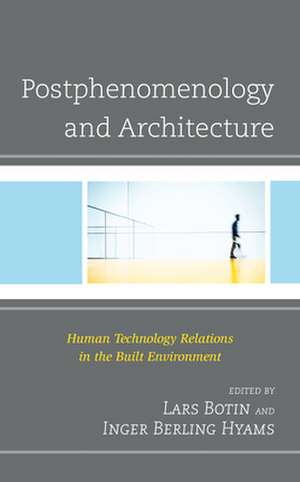Postphenomenology and Architecture: Postphenomenology and the Philosophy of Technology
en Limba Engleză Hardback – 21 feb 2021
Din seria Postphenomenology and the Philosophy of Technology
-
 Preț: 398.01 lei
Preț: 398.01 lei -
 Preț: 348.16 lei
Preț: 348.16 lei - 27%
 Preț: 713.44 lei
Preț: 713.44 lei - 23%
 Preț: 665.08 lei
Preț: 665.08 lei - 27%
 Preț: 710.16 lei
Preț: 710.16 lei - 27%
 Preț: 755.08 lei
Preț: 755.08 lei - 23%
 Preț: 651.01 lei
Preț: 651.01 lei - 23%
 Preț: 606.81 lei
Preț: 606.81 lei -
 Preț: 353.01 lei
Preț: 353.01 lei -
 Preț: 377.82 lei
Preț: 377.82 lei - 23%
 Preț: 685.56 lei
Preț: 685.56 lei - 23%
 Preț: 648.21 lei
Preț: 648.21 lei - 23%
 Preț: 651.48 lei
Preț: 651.48 lei -
 Preț: 505.96 lei
Preț: 505.96 lei -
 Preț: 405.89 lei
Preț: 405.89 lei - 27%
 Preț: 716.97 lei
Preț: 716.97 lei - 27%
 Preț: 738.80 lei
Preț: 738.80 lei - 23%
 Preț: 557.59 lei
Preț: 557.59 lei
Preț: 686.57 lei
Preț vechi: 891.65 lei
-23% Nou
Puncte Express: 1030
Preț estimativ în valută:
131.38€ • 140.49$ • 109.54£
131.38€ • 140.49$ • 109.54£
Carte tipărită la comandă
Livrare economică 18 aprilie-02 mai
Preluare comenzi: 021 569.72.76
Specificații
ISBN-13: 9781793609434
ISBN-10: 1793609438
Pagini: 266
Dimensiuni: 152 x 229 x 26 mm
Greutate: 0.54 kg
Editura: Rowman & Littlefield
Seria Postphenomenology and the Philosophy of Technology
ISBN-10: 1793609438
Pagini: 266
Dimensiuni: 152 x 229 x 26 mm
Greutate: 0.54 kg
Editura: Rowman & Littlefield
Seria Postphenomenology and the Philosophy of Technology
Notă biografică
Edited by Lars Botin and Inger Berling Hyams - Contributions by Charley Appleton; Inger Berling Hyams; Ditte Be...
Cuprins
Descriere
This edited collection provides insight into understanding architecture and urban design as technology. In order to understand how and why we live in built environments, we are in need of a conceptual framework that takes into account what role architecture as technology plays in our being and becoming in the world.
